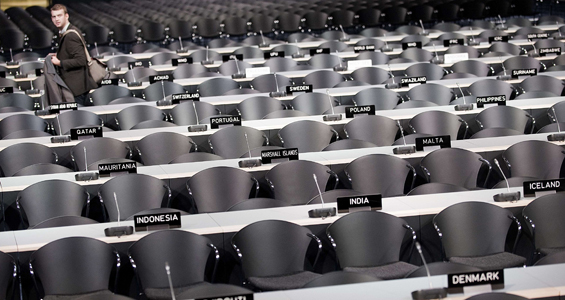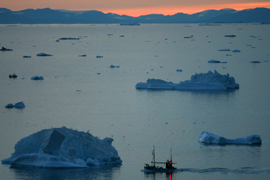What will climate summit achieve?
Though expectations are high, Copenhagen is unlikely to result in landmark deals.

 |
| The summit in Denmark will seek binding agreements to cut global carbon emissions [AFP] |
It has been planned and discussed for years. It has been called the most important global meeting since the Second World War.
And now it is here. The Copenhagen Climate Change summit. It is a two-week gathering of more than 190 nations hoping to achieve binding agreements to cut global carbon emissions and a comprehensive taxation scheme which would re-distribute the wealth of the few big developed nations so developing countries, and there is many more of them, will give up their reliance on cheap fossil fuel energy.
Keep reading
list of 4 itemsAfter the Hurricane
World’s coral reefs face global bleaching crisis
Why is Germany maintaining economic ties with China?
It is been widely reported that any legally binding deal is unlikely. What we are expecting is a political commitment to meet targets.
At the meeting in Barcelona last month which was meant to deliver the final agreements to be signed in Denmark, one environmental activist told me “a good deal in a year’s time is better than a poor one now – but there’s nothing stopping them doing a deal now”.
‘Climategate’
Two years ago the Inter-Governmental panel on Climate Change warned of the dangers. Then 152 scientists from 30 countries presented evidence that global temperatures are increasing and it is likely that man is reponsible. They said unless carbon dioxide emissions are brought under control, global warming will continue. Their evidence was reviewed by 600 more experts who agreed with the findings
| in depth |
|
|
But despite what appears to be overwhelming evidence to the layman, discussions will be overshadowed by “Climategate”, the unfortunately named scandal over leaked emails from the UK which suggested that there was no human cause of global warming. Sceptics leapt on the evidence quicker than a drowning man on a boat.
This, they said, showed climate change was a hoax and an expensive one at that.
And it’s the last part of that sentence which holds the key to understanding what will unfold in Copenhagen. It’s not about the science. It’s about the money.
The representatives from island states will talk about the threat they face to their very existence from rising seawater. African delegates will warn of droughts and food shortages while most of the delegates will talk about the effect on industries and jobs and the rate of economic growth.
It’ll be about winners and losers and how any agreement will reshape global markets.
Political cost of emissions
And for Europe and the USA, it will be about the economic and political cost of cutting emissions. America – the world’s biggest polluter – says it will contribute its “fair share” of financial aid to the poorer countries. Like others, they have been reluctant to name the price they are willing to pay.
Most developing economies will only move away from carbon-based economies if there’s a huge financial incentive because at the moment it’s worth their while to drill for oil and dig for coal. Their argument is the developed world caused this and need to pay to sort it out.
There are opportunities to develop and expand new technology industries, but the world is way behind where it needs to be if a 20 per cent cut by 2020 is to be achieved.
 |
| Climate change evidence has been mired in controversy ahead of the summit |
It’s important to remember those cuts would only mean the world limits the rise in temperatures by 2 per cent in that time. It won’t stop the rise or even have temperatures moving in the opposite direction. That moment’s gone.
And so what is likely to come out of Copenhagen? A full deal with firm commitments and loose ends tied up would confound expectations and astound most observers. So that can be ruled out. At the other end of the scale, there could be complete breakdown.
But most countries accept this is an issue which has to be addressed and as the weekend protests around the world showed, this is something people care about. So politicians won’t allow a complete collapse because they would look bad, unless they can blame it on someone else.
The most likely outcome is a political deal which agrees certain targets, but the hows and how much it’ll cost will be thrashed out maybe by the end of 2010, although any timescale becomes elastic.
So Copenhagen’s Climate Change Summit will not be the landmark everyone hoped it would be. It will set rules and maybe even targets; it is a lot less than what may have been needed, but it is a small step in the right direction.
